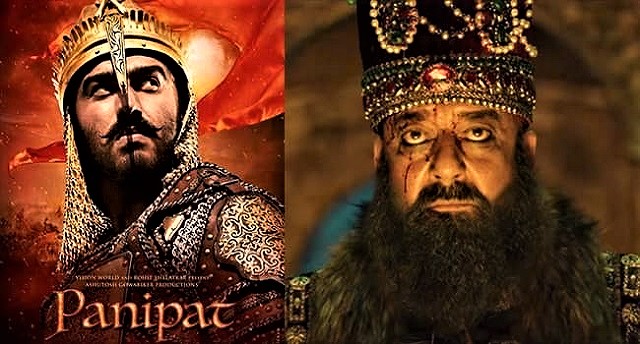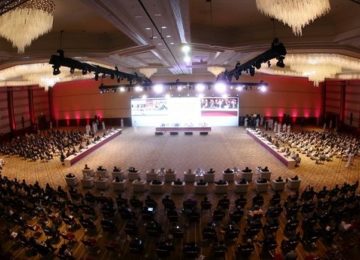December 12, 2019
Afghans are concerned over ‘misrepresentation’ of Ahmad Shah Abdali, the founder of modern Afghanistan, in the new film.
Afghans have expressed disappointment over the portrayal of the country’s founding father in the latest Bollywood period drama, Panipat, set in the 18th century.
The film depicts the 1761 Battle of Panipat fought between the forces of Afghan ruler Ahmad Shah Abdali and the army of Marathas, a Hindu community mainly based in the western Indian state of Maharashtra.
Modern Panipat is a district in the northern state of Haryana, about 85km (53 miles) from capital New Delhi.
Abdali, a hero to many Afghans, was the founder of the Durrani Empire and leader of the Pashtun tribe who defeated the Maratha army. To most Indians, he is a fierce invader who killed thousands of Maratha soldiers.
Panipat is the latest Bollywood film to attract criticism for its misrepresentation of historical characters, especially Muslim rulers from the medieval period.
Another Bollywood film Padmaavat (2018) portrayed Alauddin Khilji, a Muslim king of Afghan origin who ruled Delhi in the 12th century, as a “savage” who “gnaws meat off the bone” – following the most prevalent stereotypes about Muslims, according to critics.
“Abdali fits the Alauddin Khilji mould of ‘otherness’ – tall, imposing, and dismissive of Hindu martial prowess. The two manifest the stock Muslim ‘invader’ tropes that dominate the 21st-century Hindu psyche,” wrote film critic and columnist Kaveree Bamzai on The Print website.
“As one of the Panipat posters on Abdali says: ‘Death strikes where his shadow falls’.”
Similarly, Kesari – released earlier this year and based on the Battle of Saragarhi in 1897 between Sikh soldiers and Afghans – was also criticised for portraying the Afghans as violent invaders.
‘Insensitive/distorted depiction’
These films have offended many Afghans, such as Hassan Amin Shoob, a Kabul-based filmmaker. He said Panipat is yet another film that “failed to capture the true essence of Afghan history and values”.
“India’s Panipat is undoubtedly of a lucrative nature, focused mainly on the Hindu aspect of the events. The director’s take on history is a failed attempt, but a make-me-happy entertainment for the Hindus,” Shoob told Al Jazeera.
“Ahmad Shah Durrani is universally acknowledged by historians as a man of wisdom.”
On Sunday, a statement released by the Afghan foreign ministry said Idrees Zaman, the acting foreign minister, met with Indian envoy to Kabul Vinay Kumar to discuss the “issue of Afghan sensitivities” surrounding the film.
Even before the film’s release, the Afghan embassy in New Delhi had written a letter to the Indian government to raise its concerns over misrepresentation of the Afghan ruler.
“Since the film is related to former Afghan emperor Ahmad Shah Abdali, any insensitive/distorted depiction of his character might provoke emotions of Afghans which could be unfairly exploited by others to adversely affect the trust and harmony that exists so well among the people of two countries,” the letter stated.
India has had friendly ties with Afghanistan since the fall of the Taliban in 2001, with New Delhi being a major financial backer of the Western-backed government in Kabul.
India has also earned the goodwill of the Afghans by carrying out major infrastructure projects in the war-torn country, including building the new parliament in Kabul.
Bollywood films and Hindi-language soap operas are very popular in Afghanistan, which is among the biggest markets for the Hindi film industry.
Afghans demand review of film
Nafees Ur Rehman, a Pashtun researcher from neighbouring Pakistan whose work partially focuses on the vilification of Pashtuns and Afghans in colonial literature, said he decided not to watch Panipat.
“It is fine to take some liberties while making historical films but these liberties should be consistent with the historical accounts and shouldn’t challenge them,” he told Al Jazeera.
“If I have to learn history, I can look up various authentic books, and I would prefer to watch a comedy for entertainment. But not Panipat movie.”
In 2007, Afghanistan banned the Bollywood film, Kabul Express – a story about three journalists in post-Taliban Afghanistan – because parts of it were deemed offensive to the Shia Muslim Hazara ethnic minority.
“Bollywood films most of the time vilify and stereotype Muslims. It was easier for them to find proxy in Pakistanis to portray Muslims that suited their agenda; but with the Afghans, they have found a new villain,” said Rehman.
“I think this is a result of widespread religious nationalism. And as of now, such kind of nationalism demands to find ‘heroes’ among ‘yourselves’ and ‘villains’ in ‘others’. The recent trend shows Bollywood is playing to such an audience,” he said.
Afghans also took to Twitter to express their disappointment in the film, including Naseem Sharifi, Consul General of Afghanistan in Mumbai.
“#PrimeMinisterModi it’s honor to know & have met you on various occasions. Our request is to put da [sic] new movie #panipat under review to make sure that because of a few $$ that the filmmakers are earning? we don’t lose our decade worth of hard work & efforts as friendly nations,” Sharifi said in a tweet.
In an interview on December 2, Panipat director Ashutosh Gowariker said that even though he respects the feelings of Afghans, Abdali did “invade us a few times”.
“For me, this film is not about the Hindu-Muslim battle, it’s not. It’s about stopping an invader, protecting your land, it is what the patriotic theme of the film is,” he told The Film Companion, a web channel that promotes Indian cinema.
Gowariker, whose 2001 epic Lagaan was nominated for the Oscars, claimed he retained the dignity of Abdali’s character in his film.
Jawad, a photojournalist based in Kabul, echoed the concerns raised by Rehman, saying he was disturbed by how “Islam was portrayed the religion of violence and fear” in the film.
“In one scene of the movie, it shows Abdali praying and immediately after he finishes the prayer, he is shown killing people,” he said.
“Nowadays, people do not have time to read history, they believe what they see. I wish the Indian filmmaker focused on real history, instead of being biased towards Afghans and Muslims.
“Abdali is described as a thief and a looter, which is not true. I can understand, for Indians Abdali is an invader but the incidents need to be shown according to the facts, not less not more.”
Original Source: ALJAZEERA








